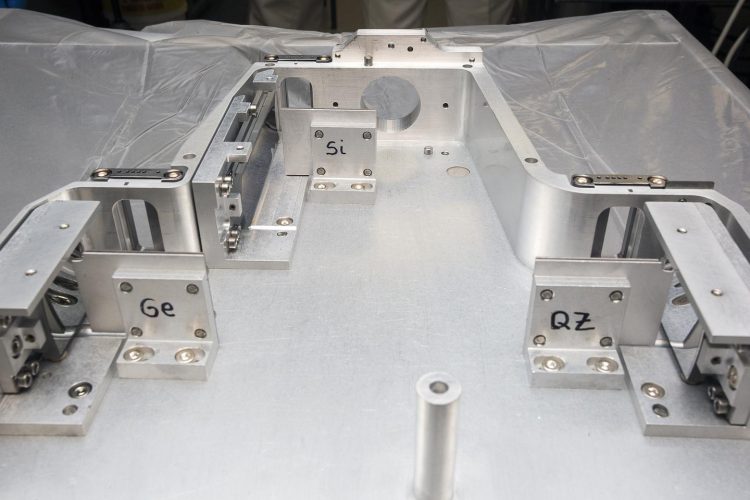PPPL scientists deliver new high-resolution diagnostic to national laser facility

The three spectrometer channels inside the instrument. Credit: Elle Starkman
PPPL has used spectrometers for decades to analyze the electromagnetic spectrum of plasma, the hot fourth state of matter in which electrons have separated from atomic nuclei, inside doughnut-shaped fusion devices known as tokamaks.
These devices heat the particles and confine them in magnetic fields, causing the nuclei to fuse and produce fusion energy. By contrast, NIF's high-powered lasers cause fusion by heating the exterior of the fuel pellet. As the exterior vaporizes, pressure extends inward towards the pellet's core, crushing hydrogen atoms together until they fuse and release their energy.
NIF tested and confirmed that the spectrometer was operating as expected on September 28. During the experiment, the device accurately measured the electron temperature and density of a fuel capsule during the fusion process.
“Measuring these conditions is key to achieving ignition of a self-sustaining fusion process on NIF,” said PPPL physicist Lan Gao, who helped design and build the device. “Everything worked out very nicely. The signal level we got was just like what we predicted.”
The spectrometer will focus on a small capsule of simulated fuel that includes the element krypton to measure how the density and temperature of the hot electrons in the plasma change over time. “The fusion yield is very sensitive to temperature,” said Marilyn Schneider, leader of NIF's Radiation Physics and Spectroscopic Diagnostics Group. “The spectrometer will provide the most sensitive temperature measurements to date. The device's ability to plot temperature against time will also be very helpful.”
###
Other PPPL researchers who contributed to this project include Principal Research Physicist Ken Hill; the Head of the Plasma Science & Technology Department Phil Efthimion; and graduate student Brian Kraus.
PPPL, on Princeton University's Forrestal Campus in Plainsboro, N.J., is devoted to creating new knowledge about the physics of plasmas — ultra-hot, charged gases — and to developing practical solutions for the creation of fusion energy. The Laboratory is managed by the University for the U.S. Department of Energy's Office of Science, which is the largest single supporter of basic research in the physical sciences in the United States, and is working to address some of the most pressing challenges of our time. For more information, please visit science.energy.gov
Media Contact
All latest news from the category: Physics and Astronomy
This area deals with the fundamental laws and building blocks of nature and how they interact, the properties and the behavior of matter, and research into space and time and their structures.
innovations-report provides in-depth reports and articles on subjects such as astrophysics, laser technologies, nuclear, quantum, particle and solid-state physics, nanotechnologies, planetary research and findings (Mars, Venus) and developments related to the Hubble Telescope.
Newest articles

Trotting robots reveal emergence of animal gait transitions
A four-legged robot trained with machine learning by EPFL researchers has learned to avoid falls by spontaneously switching between walking, trotting, and pronking – a milestone for roboticists as well…

Innovation promises to prevent power pole-top fires
Engineers in Australia have found a new way to make power-pole insulators resistant to fire and electrical sparking, promising to prevent dangerous pole-top fires and reduce blackouts. Pole-top fires pose…

Possible alternative to antibiotics produced by bacteria
Antibacterial substance from staphylococci discovered with new mechanism of action against natural competitors. Many bacteria produce substances to gain an advantage over competitors in their highly competitive natural environment. Researchers…





















